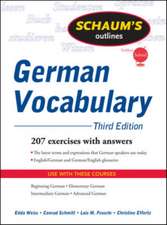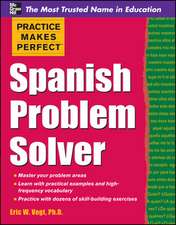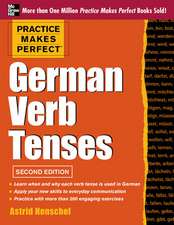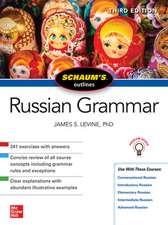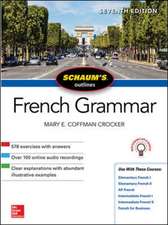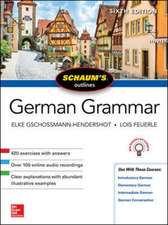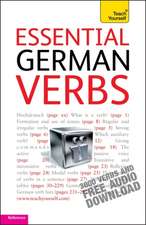German Verb Drills, Fifth Edition
Autor Astrid Henschelen Limba Engleză Paperback – 16 apr 2017
Get on the Fast Track to Mastering the German Verb System!
Confident use of verbs is an essential foundation for learning German. German Verb Drills will help you lay this foundation through clear explanations and rigorous practice. You language skills will be strengthened as you become more fluent in your use of the correct tenses and verb forms.
Inside you’ll find:
● Numerous examples that demonstrate how the German verb system works
● Review and mastery exercises to reinforce your learning
● An answer key to give you clear explanations on every concept
German Verb Drills is the bestselling source of practice that you can use either in conjunction with a course or as a self-learning tool. You’ll become less intimidated by verb conjugation and, instead, more confident in your German writing and speaking skills.
Preț: 103.66 lei
Preț vechi: 121.88 lei
-15% Nou
Puncte Express: 155
Preț estimativ în valută:
19.84€ • 20.75$ • 16.48£
19.84€ • 20.75$ • 16.48£
Carte tipărită la comandă
Livrare economică 03-09 aprilie
Livrare express 26 februarie-04 martie pentru 42.21 lei
Preluare comenzi: 021 569.72.76
Specificații
ISBN-13: 9781260010602
ISBN-10: 1260010600
Pagini: 160
Dimensiuni: 216 x 274 x 10 mm
Greutate: 0.34 kg
Ediția:5
Editura: McGraw Hill Education
Colecția McGraw-Hill
Locul publicării:United States
ISBN-10: 1260010600
Pagini: 160
Dimensiuni: 216 x 274 x 10 mm
Greutate: 0.34 kg
Ediția:5
Editura: McGraw Hill Education
Colecția McGraw-Hill
Locul publicării:United States
Cuprins
Introduction
Part 1 The Present Tense of Regular, Irregular, and Modal Verbs
1 Infinitive
2 Present tense of regular verbs
Interrogative
3 Present tense of haben, sein, and werden
4 Present tense of irregular verbs
Vowel change from e to i
Vowel change from e to ie
Vowel change from a to ä
5 Verbs with separable prefixes in the present tense
Common separable prefixes
6 Modal auxiliaries in the present tense
Review of part 1
Part 2 Imperative, Future Tense, and Present Perfect Tense
7 Imperative
Formal command
Familiar command, singular
Familiar command, plural
Exhortations (mild commands)
8 Future tense
Adverb of time
9 Present perfect tense of weak verbs
Use of tense
Formation of tense
Formation of past participle of weak verbs
10 Haben or sein as the auxiliary verb in perfect tenses
11 Present perfect tense of strong verbs
Formation of past participle
12 Present perfect tense of mixed verbs
13 Present perfect tense with separable prefixes
14 Present perfect tense with inseparable prefixes and verb stems ending in -ier
Inseparable prefixes
Verb stems ending in -ier
15 Present perfect tense with modal auxiliaries
Review of part 2
Part 3 The Past Tense
16 Use of past tense
17 Past tense of weak verbs
Definition of weak and strong verbs
Formation of weak verbs in the past tense
18 Past tense of strong verbs
19 Past tense of mixed verbs
20 Past tense of haben, sein, and werden
21 Past tense of modal auxiliaries
Review of part 3
Part 4 Perfect Tenses, Reflexive and Impersonal Verbs, Infinitive Constructions, and Passive Voice
22 Past perfect tense
Use of tense
Formation of tense
23 Future perfect tense
Use of tense
Formation of tense
24 Reflexive verbs
Use of the reflexive
Formation of reflexive construction
Perfect tenses of reflexive verbs
Use of the dative with personal interest
Reflexive commands
25 Impersonal verbs
Es gibt or es ist, es sind
26 Infinitive constructions
Verbal nouns
Double infinitives with modals
Double infinitives with lassen, helfen, sehen, etc.
Infinitives without zu
Infinitives with or without zu
Infinitives with zu
Prepositions and infinitives
Infinitives and commands
27 The passive voice
Formation of the passive voice
Von or durch
Conjugation of passive voice
Man as a substitute
Passive with modal auxiliaries
Review of part 4
Part 5 The Subjunctive and Conditional Moods
28 Formation of the subjunctive mood
Simple tenses
Compound tenses
29 Use of the subjunctive—expressing a wish
Use of the subjunctive
Subjunctive in expressing a wish
30 Subjunctive after als ob or als wenn
Present
Past
Omission of ob or wenn
31 Conditional
Use of the conditional
Formation of the conditional
32 Unreal conditions (subjunctive or conditional)
Present
Past
Omission of wenn
33 Indirect discourse with the subjunctive and the indicative
Indirect discourse with the subjunctive
Indirect discourse with the indicative
Review of part 5
Appendix: Final Review
Answer Key
Index of Verbs
German–English
English–German
Part 1 The Present Tense of Regular, Irregular, and Modal Verbs
1 Infinitive
2 Present tense of regular verbs
Interrogative
3 Present tense of haben, sein, and werden
4 Present tense of irregular verbs
Vowel change from e to i
Vowel change from e to ie
Vowel change from a to ä
5 Verbs with separable prefixes in the present tense
Common separable prefixes
6 Modal auxiliaries in the present tense
Review of part 1
Part 2 Imperative, Future Tense, and Present Perfect Tense
7 Imperative
Formal command
Familiar command, singular
Familiar command, plural
Exhortations (mild commands)
8 Future tense
Adverb of time
9 Present perfect tense of weak verbs
Use of tense
Formation of tense
Formation of past participle of weak verbs
10 Haben or sein as the auxiliary verb in perfect tenses
11 Present perfect tense of strong verbs
Formation of past participle
12 Present perfect tense of mixed verbs
13 Present perfect tense with separable prefixes
14 Present perfect tense with inseparable prefixes and verb stems ending in -ier
Inseparable prefixes
Verb stems ending in -ier
15 Present perfect tense with modal auxiliaries
Review of part 2
Part 3 The Past Tense
16 Use of past tense
17 Past tense of weak verbs
Definition of weak and strong verbs
Formation of weak verbs in the past tense
18 Past tense of strong verbs
19 Past tense of mixed verbs
20 Past tense of haben, sein, and werden
21 Past tense of modal auxiliaries
Review of part 3
Part 4 Perfect Tenses, Reflexive and Impersonal Verbs, Infinitive Constructions, and Passive Voice
22 Past perfect tense
Use of tense
Formation of tense
23 Future perfect tense
Use of tense
Formation of tense
24 Reflexive verbs
Use of the reflexive
Formation of reflexive construction
Perfect tenses of reflexive verbs
Use of the dative with personal interest
Reflexive commands
25 Impersonal verbs
Es gibt or es ist, es sind
26 Infinitive constructions
Verbal nouns
Double infinitives with modals
Double infinitives with lassen, helfen, sehen, etc.
Infinitives without zu
Infinitives with or without zu
Infinitives with zu
Prepositions and infinitives
Infinitives and commands
27 The passive voice
Formation of the passive voice
Von or durch
Conjugation of passive voice
Man as a substitute
Passive with modal auxiliaries
Review of part 4
Part 5 The Subjunctive and Conditional Moods
28 Formation of the subjunctive mood
Simple tenses
Compound tenses
29 Use of the subjunctive—expressing a wish
Use of the subjunctive
Subjunctive in expressing a wish
30 Subjunctive after als ob or als wenn
Present
Past
Omission of ob or wenn
31 Conditional
Use of the conditional
Formation of the conditional
32 Unreal conditions (subjunctive or conditional)
Present
Past
Omission of wenn
33 Indirect discourse with the subjunctive and the indicative
Indirect discourse with the subjunctive
Indirect discourse with the indicative
Review of part 5
Appendix: Final Review
Answer Key
Index of Verbs
German–English
English–German




